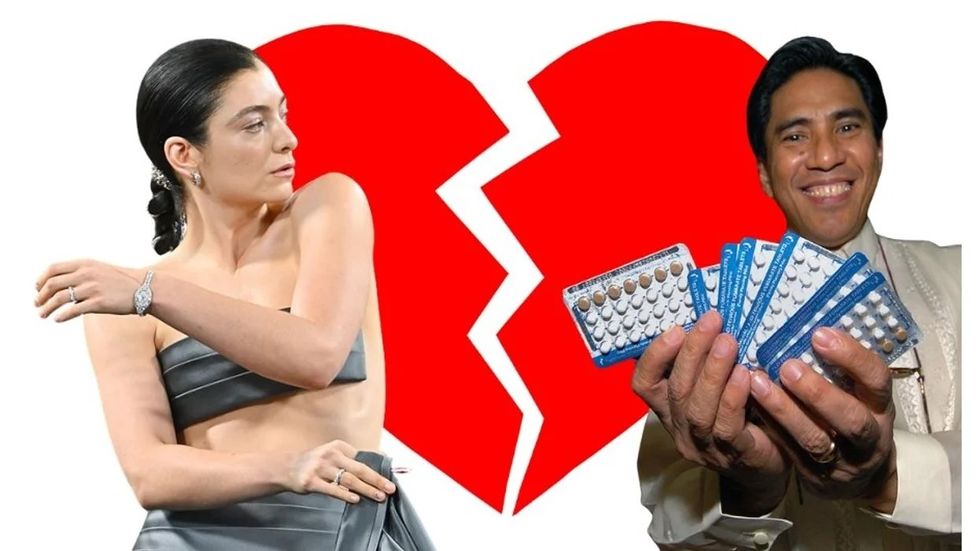
Joe Sohms/Visions of America/Getty Images

The health risks are severe and well documented. So why does nobody talk about quitting?
Filmmaker and mother Jessica Solce was frustrated by the difficulty of finding healthy, all-natural products for herself and her family. To make it easier, she created the Solarium, which curates trusted, third-party-tested foods, clothing, beauty products, and more — all free of seed oils, endocrine disruptors, carcinogens, and other harmful additives.
In this occasional column she shares recommendations and research she's picked up during her ongoing education in health and wellness.
“Changes in gray and white matter in brains of women taking [oral contraceptives] suggest that OCs have an effect on brain architecture.” —Frontiers in Neuroendocrinology, volume 67, October 2022.
I tried birth control in college. It lasted less than three months, and then I ran for the hills.
Birth control distorts sexual attraction. Women are literally put off the scent of the hunt for the right partner.
I hated how my body was feeling. It was swelling, and my mind was unsettled and lethargic. Luckily I had an old-world mother who always warned me never to take birth control, so I tiptoed into my college experiment with awareness and wariness, hypervigilant for any side effects.
Before we get into exactly why hormonal birth control is systemically wrecking your body and mind — both on a micro (you) and a macro (societal, generational) level — I'm going to skip ahead to the takeaway. This is easily one of the most important things you'll read all week, and I can't risk you clicking off before you finish reading.
Here it is: Ladies, don't use the pill, the patch, or the ring. Or any method of contraception interfering with your body's delicate balance of hormones.
It doesn’t matter if it has some “positive” side effects. Any pharmaceutical intervention will upend your body's natural balance, and whatever the “positive” side effects, they are absolutely overshadowed by the multitude of negative side effects: migraines, anxiety attacks, loss of libido, brain alterations, thrombosis, personality disorders, depression, and cancer.
Your best option, to quote Nancy Reagan, is to just say no.
Of course, the former first lady was talking about illegal drugs. But if we've learned anything in the past couple of decades, it's that the stuff the pharmaceutical companies peddle can be just as bad.
Maybe you've heard this kind of talk linked to the slogan Make America Healthy Again. Even if MAHA is a little too similar to MAGA for your taste, don't buy into the propaganda that ditching birth control is somehow a partisan issue.
In a recent interview with Rolling Stone, 29-year-old pop singer Lorde spoke positively about her decision to stop using birth control for the first time since she was fifteen. Still, she felt the need to issue a disclaimer: “I’ve now come to see my decision was maybe some quasi right-wing programming."
RELATED: Lorde and 5 other celebs who broke up with birth control

Well, if a woman living in tune with her body and not dependent on Big Pharma is right-wing, welcome to the right wing, Lorde. Welcome, all.
Here's what hormonal birth control does in addition to preventing pregnancy.
In 2008, 100 women were asked to sniff the shirts of men and rate them by odor, most to least attractive. The results suggested that women on the pill preferred the scent of men with similar MHC genes. MHC genes are crucial to the development of the immune system; offspring of parents with a well-balanced diversity of these genes tend to be more resistant to disease.
By contrast, women not on birth control were drawn to men with dissimilar MHC genes — selecting for offspring with strong immune systems. You're instinctively drawn to a man whose genes fill in what you’re missing — a match that benefits your future children. Incredible, really.
Birth control distorts sexual attraction. Women are literally put off the scent of the hunt for the right partner.
Also, when a woman goes off birth control, she can find herself no longer attracted to her partner’s pheromones.
We in the West love to point out the detrimental environmental effects of automobiles while ignoring the toxic emissions from our own bodies. All of the drugs we consume end up passing through us and right back into the water system.
This pollutes our drinking water as well as the habitats of aquatic animals. Like the herbicide atrazine, estrogen from birth control can wreak havoc on mating cycles, causing intersex conditions, low sperm count, and population collapse.
Users of hormonal contraceptives face a 20% to 30% higher risk of breast cancer. And yet most reports tend to dismiss any alarm this figure might raise. This reassuring passage is typical: "Experts say the increased risk is small and the benefits of hormonal contraceptives still outweigh the risks for many people."
Contrast that with the general attitude toward another known cancer risk: smoking cigarettes. Even just five cigarettes a day increases your risk of lung cancer by almost 8%. Once you get up to pack or two a day, that risk rises to something like 25%.
In other words, about the same increased risk as birth control.
When it comes to cigarettes, however, the "experts" sing a different tune: "There’s no 'safe' number of cigarettes you can smoke per day. Any number of cigarettes can increase your risk of developing cancer."
A 2019 study found that women who take oral contraception had a significantly smaller hypothalamus than those who don't. The hypothalamus is the region of the brain regulating any number of bodily functions, from sex drive and sleep cycles to appetite and heart rate.
A smaller hypothalamus correlates with depression and decreased emotional regulation.
Vice soon responded with an article "debunking" the study: Yes, birth control alters the structure of the brain, but who's to say that's a bad thing?
Yeah, no thanks.
A 2023 study revealed that women on oral contraceptives did not experience the typical reduction in the stress hormone ACTH after social activities. This suggests that hormonal contraceptives may alter how the body regulates stress and directly causes elevated cortisol levels.
A 2016 Danish study found that females 15 to 19 using oral contraception were likely to be diagnosed with depression at a 70% higher rate than non-users. The patch and vaginal rings had even higher correlation with depression.
Many of those diagnosed go on to take antidepressants, another lifetime prescription keeping them dependent on the pharmaceutical companies.
Still, birth control defenders say there's nothing to see here. In the words of Dr. Cora Breuner, a Seattle pediatrician who chairs the committee on adolescents for the American Academy of Pediatrics, “An unintended and unwanted pregnancy far outweighs all the other side effects that could occur from a contraceptive."
Oh, and taking birth control during adolescence can also disrupt brain development, especially processes related to the fear response.
Could rampant birth control use have anything to do with women's higher rates of anxiety disorders? Seems like a question worth asking.
What we eat goes directly into our breast milk and into our babies. Do we really need a science experiment for this logic? We're advised not to eat too much broccoli because it may give our babies uncomfortable gas.
RELATED: MAHA study unveiled: The truth behind autism

But don’t worry about those drugs you're taking, and have you considered updating your vaccines?
Do you want to fill your babies' bodies with synthetic estrogen or progestin? Logically these synthetic hormones go downstream and directly into our breast milk. If there is a negative risk to my infant’s growth, that is enough warning for me.
We are already aware that oral contraceptives increase chances of cancer and may cause behavioral and personality disorders.
So why is cancer increasing so drastically in children? We actually know. Leukemia is the most common type of cancer in children, and a Scandinavian study found a direct link to birth control.
Some birth control pills, especially those with certain hormones like androgenic progestins, can negatively affect glucose metabolism, i.e., make it harder for the body to handle sugar. This means blood sugar and insulin levels may spike after eating, which can lead to problems like insulin resistance, a higher chance of developing type 2 diabetes, and heart disease.
“I would get these migraines that would shock my body into so much pain that I would then have seizures,” said one woman in a 2018 BBC documentary. Also on the menu are anxiety attacks, weight gain, pulmonary embolisms, and blood clots.
Good luck addressing any of these problems. Most doctors aren't trained to recognize birth control side effects, often leading women to seek additional pharmaceutical solutions.
That's right, guys. Thank to the wonders of science, soon all of this can be yours too. Who knows what interesting new effects we'll see when we start tampering with male hormones?
Health begins with the awareness that our bodies are incredibly complex, elegantly constructed systems. My mission with the Solarium is to help us be better stewards of this natural gift.
Jessica Solce